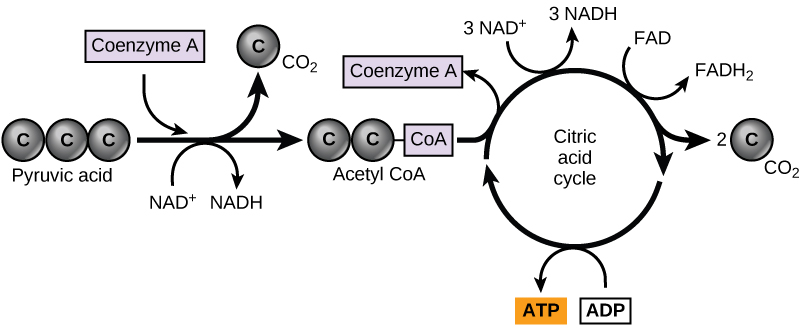
Coenzyme A (CoA) is an enzyme considered an essential cofactor for biochemical reactions, to include energy production (represented as ATP in above image). As such, CoA has gained attention as a possible means of enhancing health and performance by researchers such as Wall, Stephens, Marimuthu, Contstantin-Teodosiu, Macdonald, and Greenhaff (2012). In the following sections, this author will consider the effects of increasing two of the three CoA precursors (pantothenic acid (B5) and cysteine) and its relationship to CoA production and performance outcomes.

Wall et al. (2012) were interested in exploring B5 and cysteine supplementation as muscle CoA (CoASH) decreases during exercise. Such a reduction in CoASH is thought to decrease fat oxidation (ATP production) and possibly pyruvate dehydrogenase complex (PDC) production (important for carbohydrate oxidation) during higher intensity bouts of exercise (Wall et al., 2012). As such, the researchers recruited 8 healthy male participants over three occasions in which said participants cycled at 75% maximal oxygen uptake until exhaustion occurred, followed by a work output test (Wall et al., 2012). Muscle biopsies were taken at rest and 60 minutes after the exercise bouts. Two weeks after the initial visit, oral supplementation of D-pantothenic acid (1.5g/d) and L-cysteine (1.5g/d) was provided, or a placebo. Such was done over the second and third visits (within the period of one week) with participants in a randomized/double blind fashion (Wall et al., 2012). The following will consider the researchers’ findings.

Results of said intervention indicated that resting CoASH was not increased by supplementation of D-pantothenic acid and L-cysteine. Over three trials with said exercise bouts, CoASH was reduced by approximately 13% as measured at rest 60 minutes afterwards. Additionally, work output did not increase after supplementation of said nutrients over the three measuring periods. As such, Wall et al. (2012) concluded that CoASH content did not increase via supplementation and no measurable impact upon muscle fuel metabolism was established. It should be noted, however, that the researchers’ sample size was not large (i.e., 8 participants) and might not be truly representative of larger populations.
In conclusion, supplementing additional B5 and cysteine did not appear to augment energy production, decrease exhaustion, or improve performance. If an individual is deficient in B5 or cysteine, it might be possible that adding said nutrients to the diet could yield improved outcomes. However, it is unlikely that supplementation within a diet rich in said nutrients would improve such measures, reminding individuals that more intake is not necessarily better.
References
Wall, B. T., Stephens, F. B., Marimuthu, K., Contstantin-Teodosiu, D., Macdonald, I. A., & Greenhaff, P. L. (2012). Acute pantothenic acid and cysteine supplementation does not affect muscle coenzyme A content, fuel selection, or exercise performance in healthy humans. Journal of Applied Physiology, 112(2), 272-278.
-Michael McIsaac
